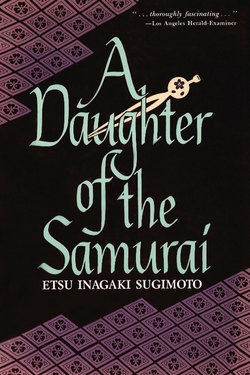Читать книгу Daughter of the Samuari - Etsu Inagaki Sugimoto - Страница 10
На сайте Литреса книга снята с продажи.
ОглавлениеPUBLISHER'S FOREWORD
THE Japan of the samurai—a land of tradition and set behavior—has almost disappeared. It would be hard to find a culture whose values were further removed from those of the West. Etsu Sugimoto was in the unusual situation of being brought up in a samurai family, being rigidly schooled so that she would be an intelligent and capable wife, and then being sent to America to meet for the first time her future husband. Her life in the West enabled her to remember her childhood with nostalgia and yet with detachment.
Her childhood memories are, perhaps, the most moving part of her autobiography. Her adventures in the family home, her journey over the mountains to Tokyo on horseback and in jin-rikishas, her first taste of meat, when the family shrine had to be covered so the gods would not be offended—these are magic memories which she recaptures perfectly; yet her account of America shows us Western life in a new light. Why, she wondered, were American women so irresponsible about money? In Japan it was their duty to see that their husband never had to think about such things. How odd to make social calls in the evening! That was the time of leisure at home. It was all very strange, and it was a long time before she could look at life in America and not be shocked.
How lucky that Madame Sugimoto did record her memories! Soon after the Meiji Restoration of 1868 introduced Western ideas into a still-feudal Japan, the samurai were fated to disappear. This, then, is a memoir of an almost-forgotten age, which seems far removed from the Japan of today.
Since it was first published in 1926, A Daughter of the Samurai has been reprinted many times. Letters of appreciation have been written to the author from people as diverse as Albert Einstein and Rabindranath Tagore. It is frequently referred to by Ruth Benedict in her Chrysanthemum and the Sword, for in this account of the traditional life of Japan are many pointers to the attitudes of present-day Japanese to their country and the world. Madame Sugimoto's autobiography shows us an apparently alien world from the inside, with which the Western reader finds himself deeply in sympathy.
THE PUBLISHERS
